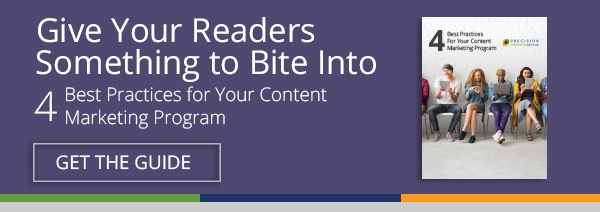I tend to follow rules. Like many firstborns, I bow to authority most of the time. My sister and I laugh when we remember our teen years, which were far from rebellious. When we said we were going to the movies, for instance, we really went to the movies.
As a writer, I’m a stickler for grammar rules. But not always. Sometimes I toss the rules in favor of writing for my readers. Certain rules should never be broken, but several guidelines you were taught in school can make your writing stilted or excessively formal. You can still communicate professionally if you break a few rules. And you’ll connect better to your audience if your writing is more accessible and conversational. Consider the following copywriting tips (and rules occasionally worth breaking) when producing content for your marketing program:
"Spell out words instead of using contractions."
While your high school term papers turned out fine with every word spelled out, today’s emails, blog posts and business correspondence may read better if you use a few contractions. Instead of cannot, say ‘‘can’t’’ once in a while. ‘‘It is’’ can be ‘‘it’s,’’ and ‘‘do not’’ can become ‘‘don’t’’ without compromising your professionalism.
"Never use sentence fragments in your writing."
Maybe, maybe not. For a great example of sentence fragments used well, take a look at your favorite author or columnist’s work. Chances are that you’ll see several sentence fragments. They can be used for emphasis, to sound conversational or to evoke humor. Fragments are fine, as long as they are intentional. A fragment that appears because the writer missed a word won’t work.
"Never end a sentence with a preposition."
Okay, back to school – remember the song, ‘‘About, above, across...?’’ Most English teachers grabbed their red pens the minute they saw a preposition at the end of a sentence. But sometimes a sentence will seem awkward when written with traditional grammar. It may need a little shaking up. For example, ‘‘Attached is the letter to which I am referring.’’ Ugh! What an awful, pompous sentence! How about a simple, ‘‘I’ve attached the letter I’m referring to.’’ Yes, it ends with a preposition. But wouldn’t you rather work with the person who wrote the second sentence? Certainly sounds friendlier than the first writer!
"Avoid starting a sentence with a conjunction."
As a refresher for those who need it – I do this for a living and still need it! – conjunctions are used to join two simple sentences to form a compound sentence. ‘‘And,’’ ‘‘yet’’ and ‘‘but’’ are some examples. Some stylists consider it improper to start a sentence with one of these words. But they can be useful when trying to avoid excessively long sentences or for emphasizing your point.
"Do not break apart infinitives."
Do you feel like you’re back in English class yet? Remember the infinitive? The word ‘‘to’’ followed by a verb – to grow, to run, to eat, etc. You may have been taught never to break up these two words, and this is generally a good rule. When you want to emphasize the verb, though, it’s considered acceptable to split the infinitive with an adverb, as in, ‘‘The company wants to drastically reduce spending.’’
While some grammar rules are made to be broken, some must be kept to present yourself professionally. Your punctuation and spelling need to be flawless. Of course, there are many online tools and resources available – www.dictionary.com is a good site – to ensure you don’t make mistakes here. They are worth looking at. (Notice the preposition?)
Robyn Bradley, PMG content writer extraordinaire, offers a good copywriting tip for communicators. Read what you write aloud. If it doesn’t sound natural and conversational when you hear it aloud, it’s time for a change. And maybe it’s time to break some rules.
Content from this post was originally published in the MetroWest Daily News and has been updated to reflect current best practices.




